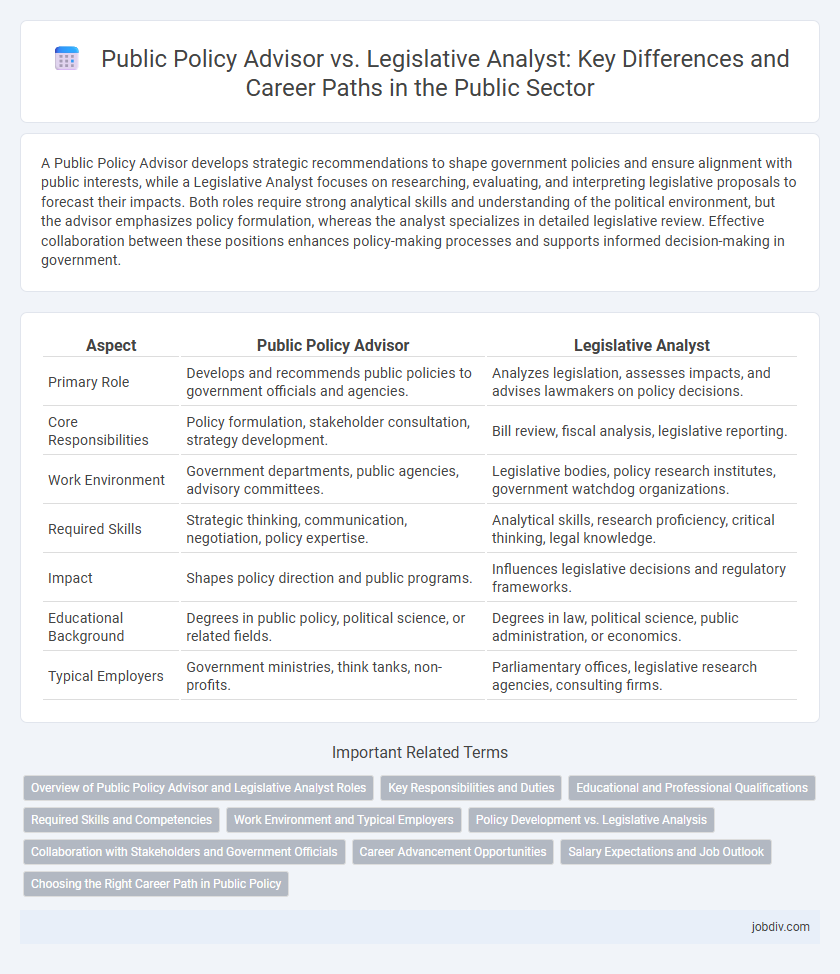A Public Policy Advisor develops strategic recommendations to shape government policies and ensure alignment with public interests, while a Legislative Analyst focuses on researching, evaluating, and interpreting legislative proposals to forecast their impacts. Both roles require strong analytical skills and understanding of the political environment, but the advisor emphasizes policy formulation, whereas the analyst specializes in detailed legislative review. Effective collaboration between these positions enhances policy-making processes and supports informed decision-making in government.
Table of Comparison
| Aspect | Public Policy Advisor | Legislative Analyst |
|---|---|---|
| Primary Role | Develops and recommends public policies to government officials and agencies. | Analyzes legislation, assesses impacts, and advises lawmakers on policy decisions. |
| Core Responsibilities | Policy formulation, stakeholder consultation, strategy development. | Bill review, fiscal analysis, legislative reporting. |
| Work Environment | Government departments, public agencies, advisory committees. | Legislative bodies, policy research institutes, government watchdog organizations. |
| Required Skills | Strategic thinking, communication, negotiation, policy expertise. | Analytical skills, research proficiency, critical thinking, legal knowledge. |
| Impact | Shapes policy direction and public programs. | Influences legislative decisions and regulatory frameworks. |
| Educational Background | Degrees in public policy, political science, or related fields. | Degrees in law, political science, public administration, or economics. |
| Typical Employers | Government ministries, think tanks, non-profits. | Parliamentary offices, legislative research agencies, consulting firms. |
Overview of Public Policy Advisor and Legislative Analyst Roles
Public Policy Advisors develop strategic recommendations by analyzing policy impacts and stakeholder interests to influence government decisions effectively. Legislative Analysts specialize in examining, interpreting, and drafting legislative proposals, ensuring precise alignment with legal frameworks and public objectives. Both roles require strong research, critical thinking, and communication skills to shape public policies and legislative processes.
Key Responsibilities and Duties
A Public Policy Advisor develops strategic recommendations by analyzing social, economic, and political trends to influence government decisions and support organizational goals. A Legislative Analyst conducts detailed reviews of legislative proposals, assessing legal language and potential impacts to support lawmakers in decision-making processes. Both roles require strong research skills and policy knowledge but differ in focus; advisors shape policy direction while analysts provide technical evaluation of legislation.
Educational and Professional Qualifications
Public Policy Advisors typically hold advanced degrees in public administration, political science, or related fields, often complemented by extensive experience in government or nonprofit sectors. Legislative Analysts usually possess a bachelor's or master's degree in political science, economics, or law, with strong analytical and research skills tailored to legislative processes. Both roles prioritize expertise in policy analysis, but Public Policy Advisors often require broader strategic and stakeholder management competencies.
Required Skills and Competencies
Public Policy Advisors require strong strategic thinking, excellent communication skills, and expertise in stakeholder engagement to effectively develop and advocate policy recommendations. Legislative Analysts must possess advanced research abilities, in-depth knowledge of legislative processes, and critical analytical skills to evaluate and interpret proposed laws and their impacts. Both roles demand proficiency in policy analysis, data interpretation, and the capacity to synthesize complex information for diverse audiences.
Work Environment and Typical Employers
Public Policy Advisors typically work in government agencies, think tanks, and nonprofit organizations, where collaboration with policymakers and stakeholders is frequent and deadlines are often tight. Legislative Analysts are commonly employed by legislative bodies, government departments, and advocacy groups, focusing on detailed policy research and legislative drafting in a structured office setting. Both roles demand strong analytical skills and the ability to adapt to fast-paced, politically sensitive environments.
Policy Development vs. Legislative Analysis
Public Policy Advisors concentrate on policy development by formulating strategic frameworks and recommending actionable solutions to address societal issues, often collaborating with stakeholders to shape effective policies. Legislative Analysts specialize in legislative analysis by evaluating proposed bills, interpreting legal language, and assessing the impact of legislation on public interests. The primary distinction lies in the former's focus on creating comprehensive policy strategies and the latter's emphasis on scrutinizing legislative content for informed decision-making.
Collaboration with Stakeholders and Government Officials
Public Policy Advisors and Legislative Analysts both engage extensively with stakeholders and government officials to shape effective legislation and policy implementation. Public Policy Advisors focus on strategic collaboration to align policy goals with public interests, often facilitating communication among diverse stakeholder groups. Legislative Analysts provide detailed evaluations and data-driven insights that inform legislative decisions and support government officials in drafting precise and impactful laws.
Career Advancement Opportunities
Public Policy Advisors often experience accelerated career advancement through leadership roles in strategy development and stakeholder engagement, leveraging their expertise to influence executive decision-making. Legislative Analysts typically advance by deepening legislative expertise, specializing in policy areas, and gaining recognition for detailed bill analysis and regulatory forecasting. Both roles offer upward mobility, with Public Policy Advisors often progressing into senior advisory or management positions, while Legislative Analysts may move into chief analyst or legislative affairs leadership.
Salary Expectations and Job Outlook
Public Policy Advisors typically earn between $65,000 and $110,000 annually, reflecting their role in strategic governmental decision-making, while Legislative Analysts have a salary range of $55,000 to $90,000, aligned with their focus on evaluating legislative proposals and impact. Employment growth for Public Policy Advisors is projected to rise by 6% over the next decade, driven by increasing demand for expertise in complex policy areas, whereas Legislative Analysts expect a steadier 4% growth, influenced by legislative activity and budget constraints. Both careers offer stable prospects in government and consultancy sectors, but Public Policy Advisors often command higher salaries due to broader responsibilities and influence.
Choosing the Right Career Path in Public Policy
A Public Policy Advisor focuses on shaping and recommending strategies to address societal issues by working closely with government officials and stakeholders. Legislative Analysts specialize in researching, evaluating, and interpreting legislative proposals to assess their potential impact on public policies. Choosing the right career path depends on your skills in strategic communication and policy formulation for advisors, or analytical expertise and legislative research for analysts.
Public Policy Advisor vs Legislative Analyst Infographic

 jobdiv.com
jobdiv.com